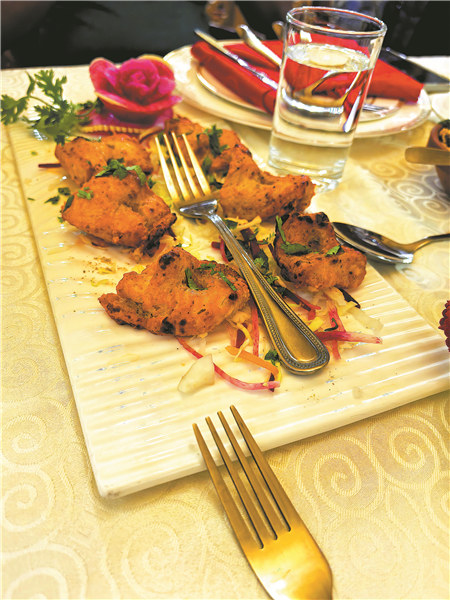

Building on the strength of their partnership, the couple ventured out and opened the Taj Pavilion restaurant in Beijing in 1998, a year after their marriage. They were hesitant at first, unsure if they could succeed, especially with the relatively small Indian and foreign communities in the city at the time.
"My wife is the backbone of my businesses. Without her, I wouldn't have succeeded," Pastakia said.
When he first opened the restaurant, his clientele was predominantly Indian. Now, he has noticed a significant shift, with Chinese patrons making up about half of his clientele.
"I'm happy to see Indian food gaining more acceptance. My restaurant has become a place where friends come to chat and gather,"said Pastakia, who attributes his success to the team he leads.
Among the dishes on offer, butter chicken, which is simmered in a creamy tomato curry, is perhaps the most popular.
"We are meticulous about preparing the food and we try to best serve our guests," said Anil Rawat, a manager at the restaurant. "Pastakia is a very good boss. We enjoy working with him very much."
During major Indian holidays, such as Diwali, the festival of lights, Pastakia sends out boxes of Indian sweets to friends and colleagues, as per tradition. "Sweets are given because they bring joy and happiness to loved ones. I want friends to have a sweet taste of Indian culture,"he said.
Thanks to his dedication to serving authentic Indian food, the restaurant now caters to big companies and embassy events.
"It's an honor for me to have hosted both Indian and Chinese guests.I'm grateful for what I have for now,"Pastakia said, adding they have received big names such as former Indian president Abdul Kalam, and former Indian prime minister Atal Bihari Vajpayee.
"When I was a humble hotel management graduate, I never expected to come this far and achieve what I have," he said.
"Whenever we see someone in need, we think of offering a helping hand.
"When society gives to you, it's natural to want to give back."